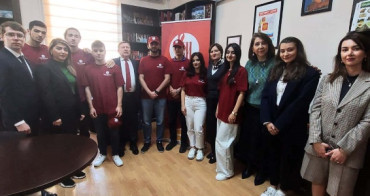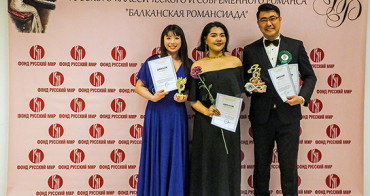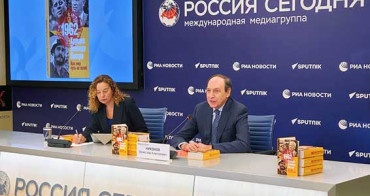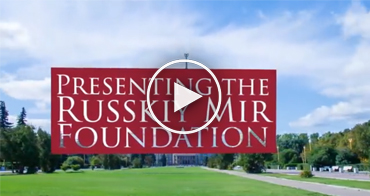
About
/ Главная / Russkiy Mir Foundation / FoundationABOUT RUSSKIY MIR FOUNDATION
Creation
The phenomenon of the Russian world has come to the center of attention in both academic circles and the public arena. The stability achieved only recently in Russia itself has allowed for a refocusing of attention on the importance and value of the Russian world, and not only to those who consider themselves participants of this world but also to modern civilization at large. It has become clear that serious steps need to be taking to both preserve and promote Russian language and culture in today’s world. These discussions came to a culmination in Russian President Vladimir Putin’s Address to the Federal Assembly in April 2007:
“The Russian language not only preserves an entire layer of truly global achievements but is also the living space for the many millions of people in the Russian-speaking world, a community that goes far beyond Russia itself. As the common heritage of many peoples, the Russian language will never become the language of hatred or enmity, xenophobia or isolationism.”
“In my view, we need to support the initiative put forward by Russian linguists to create a National Russian Language Foundation, the main aim of which will be to develop the Russian language at home, support Russian language study programmes abroad and generally promote Russian language and literature around the world.”
– Vladimir Putin, President of the Russian Federation
In June 2007 President Putin signed a decree establishing the Russkiy Mir Foundation, for the purpose of “promoting the Russian language, as Russia's national heritage and a significant aspect of Russian and world culture, and supporting Russian language teaching programs abroad.”
The Foundation is a joint project of the Ministry of Foreign Affairs and the Ministry of Education and Science and supported by both public and private funds. The Russkiy Mir Foundation is headed by Vyacheslav Nikonov, Dean of History and Political Science at the International University in Moscow and founder of the Polity Foundation. The Foundation�s Board of Trustees consists of prominent Russian academics, cultural figures, and distinguished civil servants, and is chaired by�Dmitry Kozak,�Deputy Chief of Staff of the Presidential Executive Office.
The Foundation aims to support and promote the Russian language in the world, to
strengthen its position as a language of international communication and a key
instrument for increasing the importance of the Russian Federation in the global
humanitarian sphere.
Mission Statement
Mir means Community. Peace. World
The three meanings of this small but eloquent word inspire and define Russkiy Mir’s mission – to promote understanding and peace in the world by supporting, enhancing and encouraging the appreciation of Russian language, heritage and culture.
Russkiy Mir promotes the teaching of the Russian language within Russia and abroad – both to new learners of the language and to those who already know and love Russian and wish to recapture or maintain their fluency.
Russkiy Mir brings Russia’s rich history to life, and showcases vibrant examples of Russian art and culture around the world.
Russkiy Mir reconnects the Russian community abroad with their homeland, forging new and stronger links through cultural and social programs, exchanges and assistance in relocation.
The Russian Language
And we will preserve you, Russian speech,
The great Russian word.
We will keep you free and pure,
And pass you on to our grandchildren,
free from bondage forever!
– Anna Akhmatova
Russian language is at the heart of Russian culture and society and has, for centuries, served as the language of diplomacy and commerce in many European and Asian countries. Russkiy Mir supports the study of Russian language among native and non-native speakers both domestically and abroad. This includes funding scholarship on its linguistic origins, mechanics and application; creating new standards for language instruction; producing educational materials; and sponsoring language courses, competitions and other educational programs.
Russian Culture and Heritage
Russia’s vibrant, multicultural society has made many artistic, musical, literary, and scientific contributions to global culture. Throughout its rich and varied history, Russia has been home to great artists, authors, composers and musicians – such as Rublev and Kandinskiy, Tchaikovskiy and Shostakovich, Puskhin and Solzhenitsyn. And today these rich traditions continue with a new generation of talented writers, artists and academics spreading and uniting Russian language and culture across the globe. The Russkiy Mir Foundation promotes Russian culture by sponsoring cultural programs and supporting living examples of Russian arts and culture around the world.
The Russian People
The Russian world is much more than the territory of the Russian Federation and the 143 million people living within its borders. Millions of ethnic Russians, native Russian speakers, their families and descendants scattered across the globe make up the largest diaspora population the world has ever known. Russkiy Mir reconnects the Russian diaspora with its homeland through cultural and social programs, exchanges and assistance in relocation. The Russian world also includes the millions of people worldwide who have chosen the Russian language as their subject of study, those who have developed an appreciation for Russia and its rich cultural heritage.
Welcome
Donate to the Foundation
The Russkiy Mir Foundation accepts donations from organizations, businesses and private individuals. All funds received are exclusively dedicated to the realization of noncommercial projects whose objectives coincide with the Foundations mandate. More Information on how to donate to the Russkiy Mir Foundation
Foundation NEWS


 Vyacheslav Nikonov explained why he chose the Cuban Missile Crisis as a topic.
Vyacheslav Nikonov explained why he chose the Cuban Missile Crisis as a topic. 